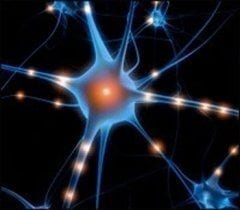Among the many benefits of massage therapy are those related to the body’s production and regulation of neurohormones. These are the hormones produced by the nervous system that affect an individual’s behavior and general wellbeing. It has long been suspected that massage therapy offers a number of mood enhancing benefits. Now scientific studies back this up. Research conducted at the TOUCH Research Institute at the University of Miami revealed that massage increases the availability of all neurohormones affecting brain chemistry.
Hormonal Effects of Massage on Mood and Wellbeing
Massage tends to elevate levels of dopamine, a neurohormone released by the hypothalamus. Dopamine influences fine motor activity like painting or playing a musical instrument. It affects intuition, inspiration, joy, and enthusiasm. Those lacking in dopamine will likely exhibit clumsiness, poor focus, and be easily distracted.
Massage can also raise the availability of serotonin, a neurohormone that regulates behavior in terms of emotions, acting to quell irritability and cravings for sex and food. Those low in serotonin often have difficulty sleeping and tend to suffer from depression and obsessive-compulsive disorders.
Are you interested in becoming a certified massage therapist?
Visit the links below to explore our massage therapy programs at a campus near you:
Enhancing Alertness and Relaxation through Massage
Research has shown that massage can achieve a number of positive results. For example, a 15 minute seated massage can elevate epinephrine (adrenaline) levels by stimulating the sympathetic nervous system. This can increase a person’s alertness. A slower, longer, deeper, and more rhythmic massage can, on the other hand, reduce epinephrine levels, creating a feeling of relaxation, and facilitating deep sleep.
The Role of Acupressure and Trigger Point Therapy
Acupressure and trigger point therapy (applying pressure to tender muscle tissue to relieve pain and dysfunction) are further examples of massage techniques that provide a number of important benefits. These techniques create endorphins, which are compounds known to reduce pain and produce a sense of euphoria. After 15 minutes of massage, endorphins come into play and their “feel good” effects may last up to 48 hours.
Oxytocin is another neurohormone produced by massage therapy. It supports feelings of attachment and can help during pregnancy, birthing, and lactation. Massage therapy has also been shown to reduce levels of Cortisol — the stress related neurohormone produced by the adrenal glands. Finally, by encouraging sleep, massage can increase the availability of growth hormones, which promote cell division and is involved in tissue repair, regeneration, and healing.
Before attempting any form of massage therapy, consult a primary care physician. If the doctor advises that massage may help, find a licensed massage therapist who is nationally certified through the National Certification Board for Therapeutic Massage & Bodywork (www.ncbtmb.org) or the American Massage Therapy Association (www.amtamassage.org).
Featured Posts:

